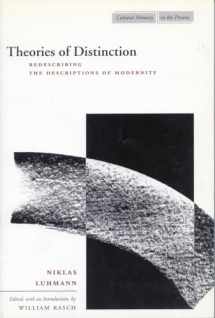
Theories of Distinction: Redescribing the Descriptions of Modernity (Cultural Memory in the Present)
Book details
Summary
Description
The essays in this volume by Germany's leading social theorist of the late twentieth century formulate what he considered to be the preconditions for an adequate theory of modern society. The first two essays deal with the modern European philosophical and scientific tradition, notably the ogy of Edmund Husserl. The next four essays concern the crucial notion of observation as defined by Luhmann. They examine the history of paradox as a logical problem and as a historically conditioned feature of rhetoric; deconstruct the thinking of Jacques Derrida, especially his language-centered allegiances; discuss the usefulness of Spencer Brown's Laws of Form; and assess the consequences of observation and paradox for epistemology. The following essays present Luhmann's theory of communication and his articulation of the difference between thought and communication, a difference that makes clear one of Luhmann's most radical and controversial theses, that the individual not only does not form the basic element of society but is excluded from it altogether, situated instead in the environment of the social system. The book concludes with a polemic against the critical thought of the Frankfurt School of postwar German social thought.


We would LOVE it if you could help us and other readers by reviewing the book
Book review



